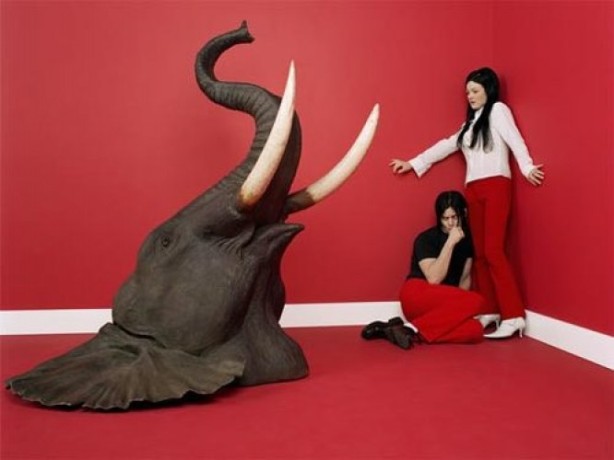The White Stripes
If Meursault from Albert Camus’ The Stranger were capable of describing his feelings it would probably sound similar to Jack White’s high tenor and penchant for self destructive lyricism. Meuserault is a character incapable of simple communication and identification of normal human feelings. His narrative tone describes an objective point of view devoid of most emotion making him a character that is difficult to identify with and frustratingly transparent about his own personal needs. With all of these faults that a normal person would find absolutely undesirable Camus creates a sense of irony, by placing Meuaerault in a relationship with a young woman named Marie who is a former co-worker of Meusault. Marie and Meaursault share the similar interest in sunbathing but Marie aggressively wants to take their relationship for a drive down matrimony boulevard and it is apparent that Meursault is solely interested in the carnal passions of the relationship.
Since Mearusault seems incapable of revealing simple human emotions it is difficult to understand what he sees in Marie but what is revealed is that his interest seems strictly physical. If Mearsault were to reveal his feelings to Marie in song it would probably sound like The White Stripes- There’s No Home for You Here. In this song, the singer begins to reveal his dislike and utter failure of his current relationship. The first stanza of the song describes a man who is “waiting for the proper time to tell…” his lover that she is “…impossible to get along with..” and the man finds it hard to even look at his lover and reveals that “it helps to have a mirror in the room” implying that he would prefer to look at himself rather than his girlfriend. The mirror imagery tends to lead to the idea that the singer is more self involved and cares only for his own feelings which he is close to sharing with his lover. Much like Camus’ main character.
Meaursault finds himself in this situation when he speaks to Marie. Dialogue between the lovers are voided from the novel while his only interest in Marie remains a physical attraction. There is a tendency for his mind to wonder in simple discussion and he seems to only entertain Marie’s desire for a larger commitment so that he may continue to have sexual relations. His needs for Marie become less when he is incarcerated for murder and when he eventually come to the realization that he will not be permitted to visit with Mari he states, “Once I realized that I was not going to have any woman I did not miss Marie as much” ( Camus 334) This leads to a realization and an acceptance of his place and his new environ where since he will not be permitted visits to Marie there is no need to further humor Marie with her desires of marriage.
Camus creates a main character that is blatantly forward with the needs the self but lacks the realization of life until later in the novel when he is forced to come to terms with his own mortality. Similarly, Jack White’s lyrics suggest that the singer is only humoring a lover and come to the realization that he is tired of doing it. The idea of self reflection is hinted on but the tonality of the song with whispered lyrics that are followed by measures of quick rhythm accompanied by staccato noted guitar solos shows a repressed rage that differs from Meurault who shows little irritation. . It is the objective whispered lyrics of dissatisfaction that are counterbalanced with the subjective heavy guitar distortion and crashing symbols that drive the message home. If only Meursault had an electric guitar, some sound petals, and a complex/estranged relationship with his drummer to balance his objective reasoning. Maybe he too would find himself in the spotlight of sellout crowds and not with his head in the gallows. Jack White will continue to rock and Meursault’s head will just roll.
There’s no home for you here girl, go away
There’s no home for you here
I’d like to think that all of this constant interaction
Is just the kind of make you drive yourself away
Each simple gesture done by me is counteracted
And leaves me standing here with nothing else to say
Completely baffled by a backward indication
That an inspired word will come across your tongue
Hands moving upward to propel the situation
Have simply halted
And now the conversation’s done
There’s no home for you here girl, go away
There’s no home for you here
I’m only waiting for the proper time to tell you
That it’s impossible to get along with you
It’s hard to look you in the face when we are talking
So it helps to have a mirror in the room
I’ve not been really looking forward to the performance
But there’s my cue and there’s a question on your face
Fortunately I have come across an answer
Which is go away
And do not leave a trace
There’s no home for you here girl, go away
There’s no home for you here
Waking up for breakfast
Burning matches
Talking quickly
Breaking baubles
Throwing garbage
Drinking soda
Looking happy
Taking pictures
So completely stupid
Just go away
There’s no home for you
There’s no home for you here here girl, go away

